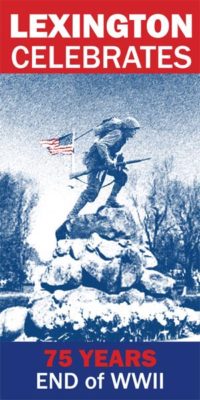
In addition to supporting the Library through planned giving, Shirley Stolz served on the Building Campaign, which helped finance the latest renovations completed in 2004. Photo by Jeri Zeder
By Jeri Zeder |
In 1931, when Shirley Stolz was six years old, she borrowed her very first book from Cary Memorial Library. It was The Little Dutch Tulip Girl, by Madeline Brandeis. On the cover was a drawing of a girl in wooden shoes and a bright red skirt, sitting outside her tidy house, admiring the red and white tulips in her yard as a windmill turned in the background. It isn’t hard to imagine a very young Shirley, a reader before she even started school, skipping home with her mother, father, and sister on their weekly Friday night library outing, proudly carrying her brand new library card, eager to start reading about the faraway land of Holland.
But Shirley has another memory of books—a searing one. At the end of first grade, she fell ill with scarlet fever and was quarantined to her bedroom. When she got better, she faced what was then the practice to keep the illness from spreading: the burning of everything in her room. Everything. “I can remember looking out and seeing them burning my books,” Shirley says. “It just made books more precious than ever.”
Today, Shirley is making the ultimate gesture toward her life-long love of books and of Cary Memorial Library: she is providing for the Library in her will. “Cary Library has always been home to me,” Shirley says. “I feel so secure and happy here. It seems so important to support this one institution so it can go on forever.”
Her will establishes the Norman and Shirley Stolz Fund, named for herself and her husband, who passed away in 2010. Jeanne Krieger, president of the Cary Memorial Library Foundation, says she is grateful for Shirley’s planned gift. “Planned giving is the way to share your legacy with future readers,” she says. “Contributions are what make this great library extraordinary.” The Foundation raises needed funds to sustain and further the mission of Lexington’s public library.
Norman’s route to books took a very different path from Shirley’s. Where Shirley read voraciously from childhood, Norman had no time for reading. Growing up during the Great Depression, he always had to work. As a young man, he spent five years in the Navy during World War II and then decided to apply to MIT for college. To prepare for his college interview, Norman read The Autobiography of Benjamin Franklin—only the second book he’d ever read in his life. In 1946, he and Shirley, who had graduated from Vassar, met on a blind date sailing on the Charles River, when Norman was a sophomore at MIT. “We hit it off on the first date, but I wasn’t ready to get married,” Shirley recalls. “I think he proposed on the third date or something. He wasn’t ready either, for goodness sakes.”
The couple settled down in Shirley’s hometown of Lexington and raised four children, whom they read to regularly. Norman made a career in insurance, while Shirley stayed home with the family, though she did earn a librarian’s degree from Simmons College when she turned 50. When their children were in college and graduate school, Norman and Shirley bought a 40-foot boat and lived on it for eight years, sailing up and down the East Coast, from Canada to the Bahamas. Books were always part of the adventure. Shirley learned to sail by borrowing books from Cary Library, and amassed a book collection of her own on women and the sea, whaling, and other nautical topics—interests that dovetailed with Norman’s background; his ancestors were sailors who settled on Nantucket. Shirley always made sure to check out the libraries along their sailing route. “I have to say, we’ve got one of the best libraries from here to Key West!” she says.
Eventually, books—and Cary Memorial Library—became a centerpiece of Shirley and Norman’s partnership. “When Norman retired, he decided that books were the most important thing in his life, other than me,” Shirley says. “It kept me busy just keeping him in books. I’d go to the Library all the time. He read whatever I picked out. He’d just go through the books like gangbusters.”
Shirley, meanwhile, became active in town affairs. She has served on the Conservation Commission, and has been a Town Meeting Member and member of the Capital Expenditures Committee for years. And, of course, she has been involved with the Library, first as a representative to the Library’s Board of Trustees, and later as a founding member of the Cary Memorial Library Foundation. Her friend and former Town Moderator, Marge Battin, says, “While Shirley has been productively involved in myriad community activities over the years, she has always been ready to drop everything else when a call for help came from the Library.”
Reflecting on her planned gift, Shirley notes that public libraries are facing considerable change, and says that legacy giving can help them adapt to future challenges. “How are we going to handle the 21st Century and the way people are reading?” she says. “What will be the result of technology, of e-books? Librarians are struggling to understand where that’s going to go. What better thing to do than support the Library?”
“I’d give up a lot to keep the Library open for everyone,” Shirley continues. “It’s the ‘everybody’ thing of it. There it is for everybody. And it’s free. What a deal.”
*Jeri Zeder is a member of the Planned Giving Committee of the Cary Memorial Library Foundation.*
Norman Stolz’s booklist – Two-and-a-Half Books

Back in the 1970s, Norman and Shirley Stolz took a number of boating courses to become proficient sailors. Here, Norman practices navigation using a sextant. Courtesy photo.
When Norman met Shirley on a blind date in the fall of 1946, she was already a Vassar graduate. Norman was a 26-year-old MIT sophomore who had spent five years in the Navy during World War II. At that point in his life, he had read only two and a half books.
His first book was a paperback that he picked up on his Atlantic voyage home from the war, Donald McKay and the Clipper Ships. It led Norman to dream bigger dreams for himself and his life. The second was The Autobiography of Benjamin Franklin, which helped get him successfully through his admissions interview for MIT. The half-read book was The Brothers Karamazov. He trotted that one out on his first date with Shirley both to impress her and to cover up for his own thin reading history.
Eventually, Norman also became a voracious reader. In 1998, he compiled the very first “Norm Stolz P&L [pleasure and learning] Booklist” for his children, their spouses, and his grandchildren. Over the years, the list grew to hundreds of titles, most in the category of biography, but including an impressive showing of volumes under the headings “Spies (Nonfiction)” and “Antarctica.” In a short history accompanying the booklist, Norman wrote this: “It would be a much better world if more people could be shown both the fun and value of reading. Norm knows that he undoubtedly would have been a better man if he had been exposed earlier in his life to the Pleasure & Learning of good books.” —JZ
The Maria Hastings CaryLegacy Society
Leaving Something Magical
The Cary Memorial Library Foundation has a comprehensive program of giving that allows everyone to support the Library in ways that are most meaningful to them. One of those ways is through legacy gifts. Koren Stembridge, the Library’s director, explains their impact:
“Gifts and legacies allowed for this library to be created and this building to be built. The future is uncertain and libraries are changing. There is a likelihood that legacy gifts made today will fund a new service or idea, allow us to maintain or grow a treasured collection, help us adapt our building to new uses. Legacy gifts have the advantage of providing a windfall—money that falls outside the normal operating budget and allows for something magical to happen.”
The Foundation created the Maria Hastings Legacy Society to recognize those who have provided for Cary Memorial Library in their estate plans. To join the society, simply inform the Foundation’s Director of Development, Kathryn Benjamin, that you have made arrangements to leave the Library a legacy gift. You can leave a legacy gift to the Library through your will, IRA, or life insurance policy. Or, you can invest in a charitable gift annuity or name the Library as a charitable beneficiary of your donor-advised fund. Find out more at http://www.carymemoriallibraryfoundation.org. —JZ

